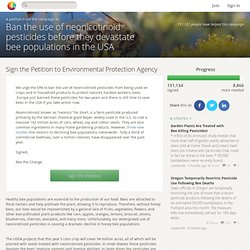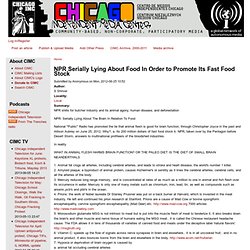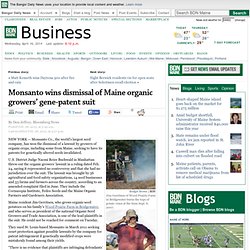

On the News With Thom Hartmann: President Obama Spoke in Defense of Massive Government Spying Programs, and More. Ban the use of neonicotinoid pesticides before they devastate bee populations in the USA. Healthy bee populations are essential to the production of our food.

Bees are attracted to floral nectars and help pollinate the plant, allowing it to reproduce. Therefore, without honey bees, our lives would be impoverished by a general lack of fruits, vegetables, flowers, and other bee-pollinated plant products like corn, apples, oranges, lemons, broccoli, onions, blueberries, cherries, avocados, and many more. Unfortunately, our widespread use of neonicotinoid pesticides is causing a dramatic decline in honey bee populations. The USDA projects that this year's corn crop will cover 94 million acres, all of which will be planted with seeds treated with neonicotinoid pesticides. In small doeses these pesticides damage the bees' immune systems and homing abilities; in large doses the pesticides are lethal.
Sign the petition to put pressure on the EPA to ban the use of these pesticides in order to protect the long-term health of our food system! NPR Serially Lying About Food In Order to Promote Its Fast Food Stock. NPR: Serially Lying About The Brain In Relation To Food National "Public" Radio has promoted the lie that animal flesh is good for brain function, through Christopher Joyce in the past and Allison Aubrey on June 25, 2012, Why?

, a. its 200 million dollars of fast food stock b. NPR, taken over by the Pentagon before Desert Storm, answers to multinational profiteers of the bloodshed industries. In reality 1. Tens of thousands in UK carry mad cow disease - Health. About 24,000 people in the UK are carrying the agent that can cause the deadly brain condition Creutzfeldt Jakob disease (CJD), twice the number scientists previously estimated.

The latest figure is based on a study of 30,000 appendixes removed in operations, which were tested for the presence of the prion, or misfolded protein, that causes the condition, linked with eating infected meat. More than a decade ago ministers assured the public that beef was safe to eat, and then had to eat their words when, in March 1996, it was announced that a new disease, variant CJD, had been discovered in humans.
It had come from eating meat from cows infected with bovine spongiform encephalopathy (BSE), a similar disease. BSE became known as mad cow disease, and in humans CJD is characterised by rapidly progressive dementia and death. However, only a small proportion of people who carried the prion developed the clinical disease. . - Independent. Monsanto wins dismissal of Maine organic growers’ gene-patent suit — Business. NEW YORK — Monsanto Co., the world’s largest seed company, has won the dismissal of a lawsuit by growers of organic crops, including some from Maine, seeking to have its patents for genetically altered seeds invalidated.

U.S. District Judge Naomi Reice Buchwald in Manhattan threw out the organic growers’ lawsuit in a ruling dated Feb. 24, saying it represented no controversy and that she had no jurisdiction over the suit. The lawsuit was brought by 36 agricultural and food safety organizations, 14 seed businesses and 33 farms and farmers across the country, according to an amended complaint filed in June. They include the Cornucopia Institute, Fedco Seeds and the Maine Organic Farmers and Gardeners Association. Maine resident Jim Gerritsen, who grows organic seed potatoes on his family’s Wood Prairie Farm in Bridgewater, and who serves as president of the national Organic Seed Growers and Trade Association, is one of the lead plaintiffs in the suit. They sued St.
Monsanto lawsuit brought on by organic farmers is dismissed. Hard to Believe: Monsanto Won. This is an archived story.

The information and any links may no longer be accurate. In early February, we reported that a Federal District Court judge agreed to hear oral arguments for a landmark lawsuit - Organic Seed Growers and Trade Association (OSGATA) et al. v. Monsanto. Over 300,000 people including farmers, seed growers and agricultural organizations participated in the case against Monsanto. The lawsuit seeks to invalidate Monsanto's patents on genetically modified (GMO) seeds and to prohibit the company from suing those whose crops become genetically contaminated because they drift through the air. Last Friday, Judge Naomi Buchwald ruled in favor of Monsanto by dismissing the case. Daniel Ravicher, lead attorney for the 81 plaintiffs represented in the lawsuit, says, "While I have great respect for Judge Buchwald, her decision to deny farmers the right to seek legal protection from one of the world's foremost patent bullies is gravely disappointing.
"